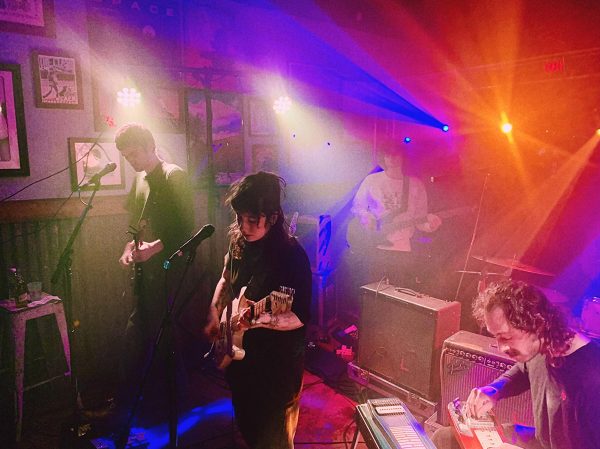REVIEW: HBO Max’s ‘Station Eleven’ examines artistry and human connection beyond apocalypse
As of today, there is no shortage of pandemic-based or post-apocalyptic fiction that paints a grueling image of America that is riddled with socio-political themes. Said media potentially holds strong relevance to the ongoing COVID-19 pandemic, which has seen a fair share of politicization and several debates of its handling. However, not many shows and movies are capable of deeply focusing on human spirituality or acknowledging an uplifting element in post-apocalyptic settings. HBO Max’s latest series, “Station Eleven” is a hopeful story about the foundation of relationships and emotional strength in a post-apocalyptic landscape.
The ten-episode miniseries is based on the 2014 novel of the same name by Emily St. John Mandel. Like the book, the series takes place decades after a deadly flu pandemic leads to civilization’s downfall. The story centers around a group of survivors who form a Shakespearian acting troupe. In its three premiere episodes, the series spans across multiple timelines and focuses on different characters in each one. The first episode focuses on Jeevan Chaudary’s (Himesh Patel) chance meeting with child actress Kirsten Raymonde (Matilda Lawler) after the two witness the death of renowned actor Arthur Leander (Gael García Bernal) during his onstage performance of King Lear. The second focuses on an adult Kirsten (Mackenzie Davis) as she prepares for her performance with the acting troupe, the Traveling Symphony, and encounters a mysterious man. The third episode returns back to the early stages of the pandemic and before as we focus on Miranda Carroll (Danielle Deadwyler), Leander’s former lover, and her stress of the pandemic.
The show strays from being a predictable post-apocalyptic series and instead draws its focus on characters and the passions that drive them. The origin of the pandemic and the possibility of combating it are only an afterthought in the episodes so far. A deeply personal story develops within characters like Kirsten and Miranda. If the COVID-19 pandemic is any indication, any person might have developed a void from the lockdown due to a lack of human essentialities, whether it be friendship, creative inspiration or willpower. As we see with Kirsten and the theatrical troupe, acting is their escape from the harsh reality. The second episode displays this sentiment almost explicitly during Kirsten’s performance of Hamlet. Set to Lee Hazelwood’s “Your Sweet Love,” the scene cuts between shots and dialogue of Kirsten’s present-day performance and young Kirsten’s reaction to a devastating revelation. The scene conveys the idea that she is looking back to a terrible memory in order to conjure the tragic nature required for her performance. While initially sad, upon further reflection, this is actually positive. She transfers her grief into something that fuels her own passion and develops an impactful performance.
The episodes so far signal an uplifting theme that promotes the possibility of a brighter future for a post-apocalyptic world. In the show, the pandemic emerges in 2020 and displays people who both react with urgency and those who doubt the situation’s graveness. The show also alludes to the dangers of the post-pandemic world, such as other survivors and cultists, but they are not explicitly stated or shown as of yet. The new world almost seems more genuine and dynamic in comparison to the pre-pandemic world, particularly if we compare the superficial personalities of Arthur’s acting friends in episode three, to the Traveling Troupe’s compassion and familial bond. The world is not displayed as a treacherous or contaminated landscape. Instead, what we see are remnants of an older world that the survivors have learned to adapt to and accept as the next stage of human evolution.
The first three episodes present a great idea of what the show’s storytelling structure can look like. The changing perspectives and timelines give way to overarching storylines that often lead to strong revelations and give depth to key character moments. This structure is not too dissimilar from the structure of HBO’s series “The Leftovers,” which “Station Eleven” showrunner Patrick Somerville had previously been a writer for. Similarly, “The Leftovers” explored themes of grief, religion and acceptance years after 2% of the world’s population disappeared from planet earth without a trace. This structure may seem like filler content to some viewers who want to invest in one character’s storyline, such as Kirsten, but it gives each character depth, while also advancing the story in a complex way.
Although only appearing in one episode so far, Davis stars as a compelling lead for the series. Kirsten’s transformation from child actress, to novice survivor and passionate, yet wary, actress is interesting and surreal, but Davis’s performance makes it more believable. Davis gives the character warmth and familial quality that makes us connect with the character. This is especially notable in the scene where Kirsten teaches a character born after the pandemic how to access tools on a smartphone. Davis showcases a character who is torn between the remnants of an old world and the adjustment to a new one. Along with empathy, Davis carries a fierceness to the character that stands out from the other troupe members’ relaxed nature, as shown when Kirsten encounters the mysterious man. The show has displayed outstanding cast members like Patel and García Bernal as they faithfully bring the book’s characters to life, but Davis is one of the most outstanding and exciting stars so far.
“Station Eleven” is an uplifting and gripping story of human relationships in the post-apocalypse. The writing and its characters are thoroughly engaging, as we bear witness to a unique story of a dystopian world. The show crafts a hopeful picture for a post-pandemic world that drives hope for our own return to normalcy, or some semblance of it.










